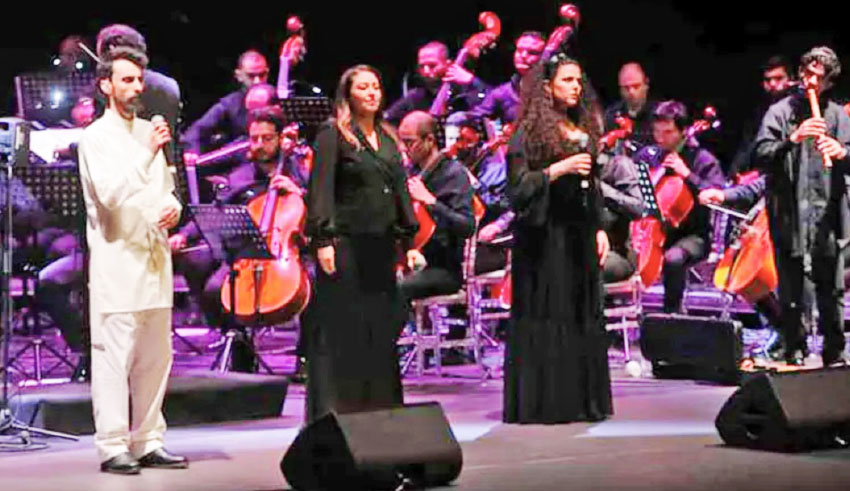A few weeks ago, Karim Thlibi presented, at the Théâtre de l’Opéra de Tunis, a preview of the musical psychodrama “Tomorrow … Doomsday”, an original and particular work proposed by this artist specializing in soundtracks and musical psychodramas. . A native of southern Tunisia, Karim Thlibi is one of the main Tunisian researchers and composers. His work is distinguished by its spiritual and psychological dimension and its openness to creativity and to innovation.
“Tomorrow… Doomsday” is a show that is part of a search for the aesthetics of Tunisian music, from a dramatic and psychological perspective, played by the Symphony Orchestra, accompanied by the choir and a pleiad of artists for vocal and instrumental interpretation, with electronic and cinematographic sound effects. Dreamed up and designed for the big stages, this show aims to meet the public at the biggest national and international events.
Writing of the fable: Mohsen Ben Nefissa, film: Abdelhamid Bouchnaq, staging: Walid Daghsni, scenic direction. Maintenance.
How do you present this project?
“Tomorrow… Doomsday” is a show that offers a universe, explores the relationship between the voice and the musical expressions charged with meaning, feelings, thoughts and residues, by calling on structures related to psychological energy telling a body in its temporality and its dramatic dimension in a purely expressionist, without overload, without emphasis according to precise dramatic intentions.
You offer a particular universe through music and voice, where does this propensity come from?
The world of music offers a multitude of choices and paths to take. But, concerning me, music, on its own, goes beyond all languages and is self-sufficient. The music is not forced to accompany the spoken word. The song is not the end nor an obligation. Music is an autonomous body that expresses both intense and contradictory feelings and sensations. The wide range of his expressiveness allows him to set the world ablaze, to say it, tell it, win it over and above all transmit it to an audience ready to accept and receive it.
This work too is a story told in images, the image of a woman in a train station… Is this your starting point?
The image of this woman, for me, synthesizes the world, we look at the world through her gaze. She becomes blind and she frees herself from the gaze of others and finds that the sound world is fairer and fairer than the visual world. His Doomsday is not an end, it is a birth, a renewal. An observant character whose body tends to disappear and whose soul continues to rise.
The tale, through the image, is strongly present, while you claim the liberation or the emancipation of music… How do you explain it?
I claim the autonomy of the music of speech and language, but not of my imagination, this imagination that I have built through this real character that I meet regularly in the train station on each of my weekly trips. It is a living body that encounters the coldness of iron and machine. An evocation of a world that surrounds him and surrounds me. Multiple images that inspired the musical writing, a reflection that goes beyond the anecdotal and goes towards sublimation.
Is the performance we attended at the Théâtre de l’Opéra the final version of the project?
By no means, a preview in the world of music, it’s a musical test, a way of experimenting to embark on another rather scenic layer of writing.
It’s an experiment, while waiting to polish the visual. Musical psychodrama is a difficult genre that requires balance and reflection. This first performance is the essential engine to set up the final show. For the first, I work on a balance according to the energy of the scenes.
The objective is a complete harmony between the various elements which, each one will bring a stone in a building which solicits, the hearing, the glance, the emotions which one appreciates and invites to the reflexion.
How do you find the balance between all these personalities who intervene with their visions and sensitivities so diverse?
We are all gathered around and at the service of the subject and the project. And I counted on the sensitivity and support of my collaborators to all go in the same direction. It is thoughtful work and this research is based on these diversities. Music remains the locomotive of all creation, with a choice of voices according to timbres and identities.
Meeting with the composer Karim Thlibi: When music frees itself from words | The Tunisian Press

